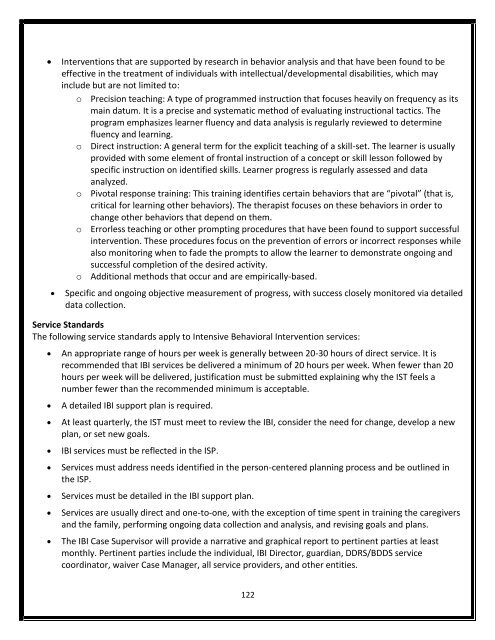DDRS Waiver Manual
2dXf5Pj
2dXf5Pj
You also want an ePaper? Increase the reach of your titles
YUMPU automatically turns print PDFs into web optimized ePapers that Google loves.
Interventions that are supported by research in behavior analysis and that have been found to be<br />
effective in the treatment of individuals with intellectual/developmental disabilities, which may<br />
include but are not limited to:<br />
o Precision teaching: A type of programmed instruction that focuses heavily on frequency as its<br />
main datum. It is a precise and systematic method of evaluating instructional tactics. The<br />
program emphasizes learner fluency and data analysis is regularly reviewed to determine<br />
fluency and learning.<br />
o Direct instruction: A general term for the explicit teaching of a skill-set. The learner is usually<br />
provided with some element of frontal instruction of a concept or skill lesson followed by<br />
specific instruction on identified skills. Learner progress is regularly assessed and data<br />
analyzed.<br />
o Pivotal response training: This training identifies certain behaviors that are “pivotal” (that is,<br />
critical for learning other behaviors). The therapist focuses on these behaviors in order to<br />
change other behaviors that depend on them.<br />
o Errorless teaching or other prompting procedures that have been found to support successful<br />
intervention. These procedures focus on the prevention of errors or incorrect responses while<br />
also monitoring when to fade the prompts to allow the learner to demonstrate ongoing and<br />
successful completion of the desired activity.<br />
o Additional methods that occur and are empirically-based.<br />
Specific and ongoing objective measurement of progress, with success closely monitored via detailed<br />
data collection.<br />
Service Standards<br />
The following service standards apply to Intensive Behavioral Intervention services:<br />
<br />
<br />
<br />
<br />
<br />
<br />
<br />
<br />
An appropriate range of hours per week is generally between 20-30 hours of direct service. It is<br />
recommended that IBI services be delivered a minimum of 20 hours per week. When fewer than 20<br />
hours per week will be delivered, justification must be submitted explaining why the IST feels a<br />
number fewer than the recommended minimum is acceptable.<br />
A detailed IBI support plan is required.<br />
At least quarterly, the IST must meet to review the IBI, consider the need for change, develop a new<br />
plan, or set new goals.<br />
IBI services must be reflected in the ISP.<br />
Services must address needs identified in the person-centered planning process and be outlined in<br />
the ISP.<br />
Services must be detailed in the IBI support plan.<br />
Services are usually direct and one-to-one, with the exception of time spent in training the caregivers<br />
and the family, performing ongoing data collection and analysis, and revising goals and plans.<br />
The IBI Case Supervisor will provide a narrative and graphical report to pertinent parties at least<br />
monthly. Pertinent parties include the individual, IBI Director, guardian, <strong>DDRS</strong>/BDDS service<br />
coordinator, waiver Case Manager, all service providers, and other entities.<br />
122


